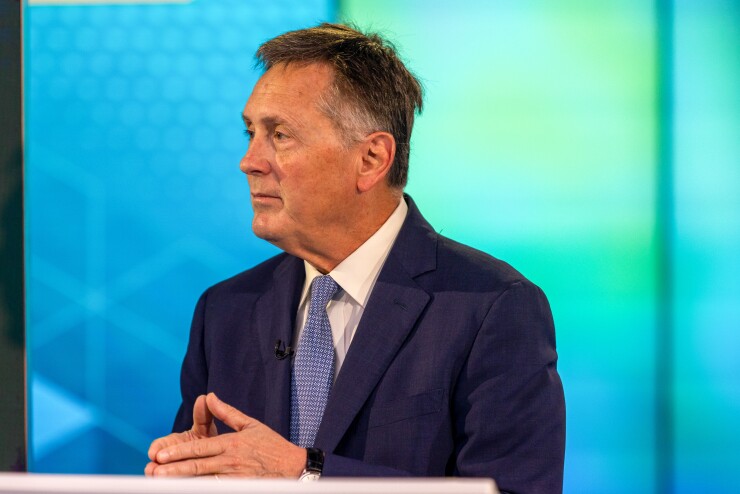(Bloomberg) -- Pacific Investment Management Co. expects to favor global bonds due in 5 to 10 years and be underweight long-maturity debt over the next half-decade, while treading carefully in private credit as weaker growth threatens lower-quality companies, according to the $2 trillion asset manager's latest annual secular outlook.
A new world order characterized by the fragmentation of traditional alliances, shifting trade dynamics and swelling deficits will fuel persistent volatility, Pimco's Richard Clarida, Andrew Balls and Daniel Ivascyn wrote in the report released Tuesday. They recommend investors safeguard their portfolios via high-quality debt from both developed and emerging countries, and see opportunities in asset-based finance as stricter bank capital rules provide an opening for money managers to displace regional banks as lenders.

"Divergent inflation, growth, and trade outlooks reinforce the need for broad, global diversification," the trio wrote. "Active investors can favor attractive medium-term bonds over longer maturities, capitalize on valuation gaps across public and private markets, and seize on opportunities in asset-based finance as risks build in lower-quality, more economically sensitive areas."
On the dollar, the Newport Beach, California-based firm said investors should expect the US currency to retain its global reserve status "given the lack of realistic alternatives." However the greenback is not immune to an extended bear market, should demand for US assets shift, "especially as overseas investors reassess their tolerance for unhedged dollar exposure."
Pimco also expects global government yield curves to continue steepening, and predicts more instances of "episodic market volatility – as seen in the U.S. in 2023 and 2025, and more sharply in the UK in 2022."
Yields on 30-year bonds from Japan, Germany, Canada, France, the UK and the US have all climbed this year, reflecting concerns about spending and rising debt levels.
Pimco said it anticipates "maintaining a bias to be overweight in the 5- to 10-year part of global yield curves and to be underweight in the long end."
So far this year the asset manager has navigated the volatility underpinning US bonds. Pimco's flagship $182 billion Income Fund has generated a gain of 3.6%, outperforming 96% of rivals. Over the past three and five years, the fund has topped 91% of peers.
In January the bond manager said that market uncertainty would help bolster returns, and it has consistently favored owning 5- to 10-year Treasuries. The five-year has declined around 0.3 percentage point to 4.06% year-to-date, while the 10-year is down 0.1 percentage point 4.45%.
"US Treasuries remain the cleanest dirty shirt in the sovereign closet over our secular timeline, underpinned by the dollar's reserve currency status," the authors wrote.
Other key points:
- "Valuations point to a lower probability of equity outperformance over fixed income" due in part to income from high quality bonds being "as good as it has been in a long time." Also, holders of bonds "can now benefit from higher yields plus potential price appreciation given central banks have ample room to cut rates."
- Although US exceptionalism versus global rivals "has faded this year," Pimco said an easing of trade and fiscal uncertainties could see US preeminence reemerge.
- US inflation will likely return to Federal Reserve target levels over the secular horizon, after any short-term increase from tariffs.
- The probability of a US recession over the next five years "appears higher" than the usual two-thirds risk
- Beyond the US, other leading economies "face distinct growth challenges, while emerging-market countries are bolstered by prudent debt management but also influenced by global trade shifts and developed-market policies."
- "Credit spreads remain tight relative to historic averages, despite elevated secular recession potential, highlighting areas of complacency across public and private corporate credit markets."
- Artificial intelligence advances may fuel volatility in the leveraged loan direct lending markets, which feature large exposures to technology companies vulnerable to AI disruption.
- "We express caution in areas of corporate private credit where capital formation has outpaced investable opportunities, leading to potential disappointment. Stresses are becoming evident in private equity and private credit and could worsen sharply in a recession."
More stories like this are available on bloomberg.com






